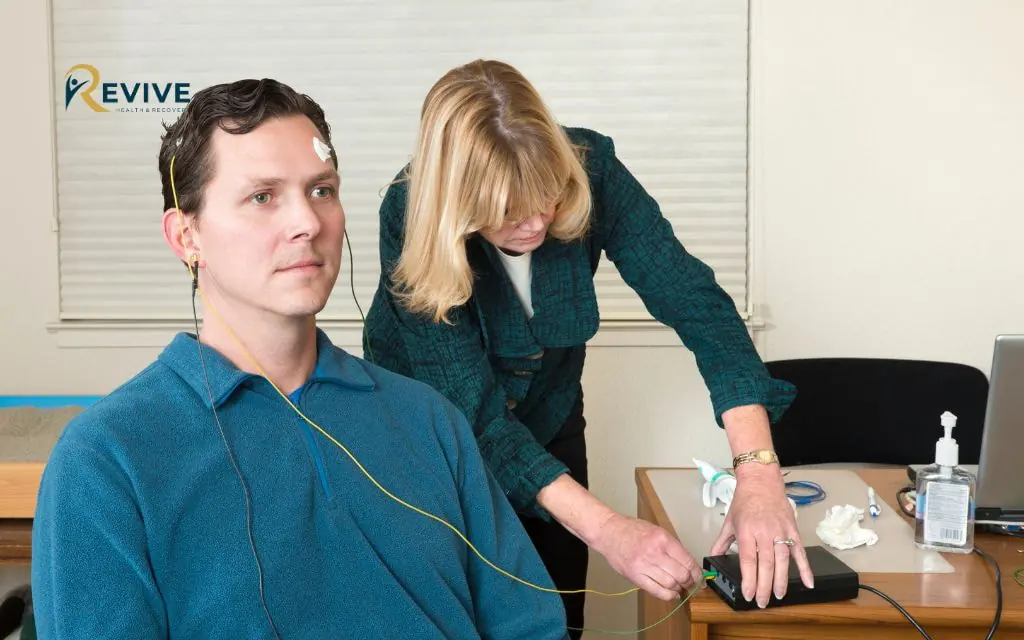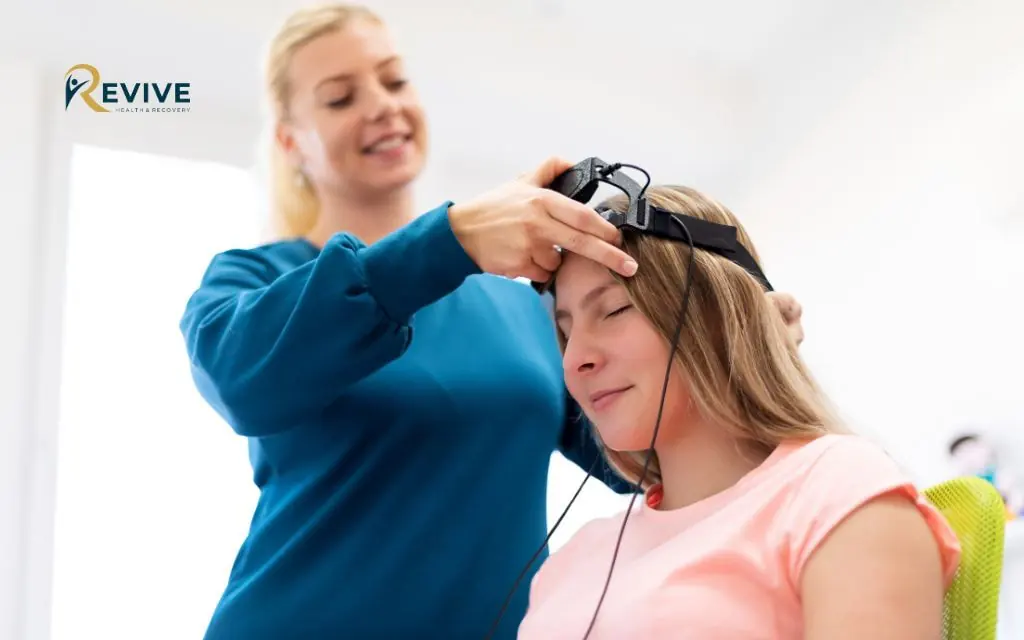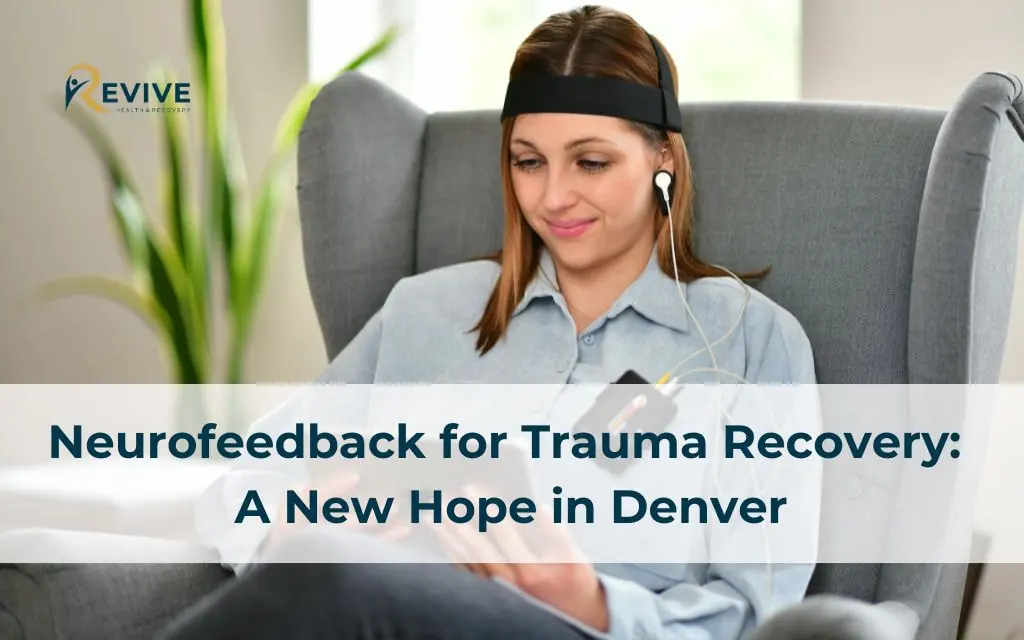In the journey toward healing from trauma, innovative approaches offer new paths to recovery. At Revive Health Recovery, we recognize the profound impact that trauma can have on individuals and communities. Neurofeedback therapy has emerged as a promising method for addressing trauma-related conditions, offering hope to those who have found traditional approaches insufficient or challenging.
Understanding Neurofeedback for trauma recovery
What is Neurofeedback?
Neurofeedback is a specialized form of biofeedback that enables individuals to visualize and modify their brain activity in real-time. This non-invasive technique uses electroencephalography (EEG) to monitor brain waves and provides immediate feedback through visual or auditory signals. The process teaches the brain to regulate itself more effectively, creating lasting changes in neural pathways.
Dr. Eugene Peniston, a pioneer in neurofeedback research, demonstrated its effectiveness for treating trauma as early as the 1990s. His protocols continue to influence current practice methods at centers across Denver. According to the National Institute of Mental Health, trauma fundamentally alters brain function, which is why targeted neurological approaches like neurofeedback show promise.
Types of Neurofeedback for trauma recovery
Several neurofeedback approaches exist, each with specific applications for trauma recovery:
- EEG Biofeedback for PTSD: The most common form, using scalp sensors to detect electrical activity
- Alpha-Theta Training: Particularly effective for trauma, inducing states conducive to processing emotional material
- Low-Frequency Training: Targets deeper brain structures involved in emotional regulation
- Z-score Neurofeedback: Compares brain activity to normative databases for precision training

The Role of Neurofeedback in Trauma Recovery
Brain Activity and Trauma
Trauma fundamentally alters brain function. Research by Dr. Bessel van der Kolk and others shows that traumatic experiences can dysregulate the autonomic nervous system and create abnormal patterns in brain regions responsible for threat detection, emotional processing, and memory. These neurobiological changes manifest as hypervigilance, intrusive memories, and emotional reactivity characteristic of post-traumatic stress disorder (PTSD).
How Neurofeedback Helps with Trauma Recovery
Neurofeedback addresses trauma at its neurobiological source by training the brain to self-regulate. Unlike exposure-based therapies, neurofeedback for trauma recovery doesn’t require discussing or reliving traumatic experiences—making it accessible to individuals who find traditional approaches overwhelming.
The International Society for Neurofeedback and Research (ISNR) maintains that this technique can help trauma survivors by:
- Reducing hyperarousal and reactivity
- Improving sleep quality
- Enhancing concentration and focus
- Decreasing intrusive thoughts and flashbacks
- Strengthening neuroplasticity in trauma treatment
When seeking to find neurofeedback therapist for trauma recovery in Denver, it’s important to locate specialists who understand these neurological mechanisms.
In addition, to maximize the effectiveness of Neurofeedback, Somatic experiencing for PTSD is also a solution you should consider, which helps release stored trauma from the body, enhancing overall recovery.
Evidence and Research
Scientific evidence supporting neurofeedback for trauma continues to grow. A 2023 clinical trial found that over 60% of participants no longer met PTSD criteria following neurofeedback treatment—particularly relevant for Denver’s veteran population.
Multiple systematic reviews confirm these findings, with studies demonstrating significant symptom reduction and improvements in quality of life. The Neurofeedback Institute has documented case studies showing sustained benefits up to five years post-treatment.
Benefits of Choosing Neurofeedback for trauma recovery
The advantages of neurofeedback for trauma recovery include:
- Non-invasive approach: No medication or surgical intervention
- Lasting results: Addresses root neurological patterns rather than just symptoms
- Complementary function: Works effectively alongside traditional therapies
- Personalization: Tailored to individual brain patterns and specific symptoms
- Empowerment: Teaches self-regulation skills that extend beyond sessions
Brain training for emotional regulation through neurofeedback offers trauma survivors tools for managing triggering situations in daily life.

Comparing Neurofeedback to Traditional Therapies
Cognitive Behavioral Therapy (CBT)
CBT remains a first-line treatment for trauma, focusing on identifying and changing unhelpful thought patterns. However, research indicates that approximately 40% of trauma patients drop out of CBT, often because verbally processing trauma proves too overwhelming.
Eye Movement Desensitization and Reprocessing (EMDR)
EMDR helps process traumatic memories through bilateral stimulation. While effective for many, some individuals find the direct engagement with traumatic content challenging.
Why Consider Neurofeedback?
Neurofeedback offers unique advantages for trauma recovery:
- Bypasses the need to verbalize traumatic experiences
- Directly addresses neurobiological patterns underlying symptoms
- Provides an alternative for non-responders to traditional approaches
- Accommodates individuals with complex trauma histories
Many clients in Denver report that the benefits of neurofeedback for trauma recovery include improvements in areas traditional therapies didn’t address, such as sleep quality and emotional regulation.
Neurofeedback Services in Denver
Top Clinics in Denver
Denver hosts several reputable providers of neurofeedback for trauma recovery in Denver, including:
- Revive Health Recovery: Our specialized trauma team offers comprehensive assessment and individualized neurofeedback protocols. We also provide VR therapy for trauma exposure, which can enhance trauma processing in a controlled environment.
- Connected Brain Counseling: Located at 1720 S. Bellaire St., offering both in-person and remote options
- Mountain Vista Psychology: Integrating neurofeedback with traditional psychological approaches
- Neuro Colorado: Emphasizing quantitative EEG assessment before treatment
What to Expect in a Session
A typical neurofeedback session at Revive Health Recovery includes:
- Brief check-in about current symptoms and progress
- Sensor placement on the scalp (non-invasive, no discomfort)
- 30-45 minutes of training with real-time feedback, often through visual displays or games
- Post-session assessment of immediate effects
Most protocols recommend 2-3 sessions weekly for 15-30 sessions total, though this varies based on individual response and trauma severity.
Cost and Insurance
The cost of neurofeedback therapy for trauma recovery in Denver varies based on provider credentials, assessment depth, and session packages. For specific pricing and insurance coverage information based on your unique situation, we recommend contacting Revive Health Recovery directly. Many providers offer payment plans to make treatment more accessible.
Getting Started with Neurofeedback in Denver
Finding a Qualified Therapist
To find an effective provider for neurofeedback therapy for trauma recovery, look for:
- Licensed mental health professionals with specialized neurofeedback training
- Certification from the Biofeedback Certification International Alliance (BCIA)
- Experience specifically with trauma and PTSD
- Knowledge of current research and protocols
- Comprehensive assessment procedures
When researching reviews of neurofeedback therapy for trauma recovery, focus on providers with documented success treating trauma-related conditions.
For those with complex PTSD, exploring ketamine-assisted therapy can complement neurofeedback by addressing severe symptoms.
Preparing for Your First Session
To start neurofeedback for trauma recovery effectively:
- Gather relevant medical history and previous treatment records
- Prepare questions about the process and expected outcomes
- Consider keeping a symptom journal to track progress
- Wear comfortable clothing with easy access to your head for sensor placement
- Avoid excessive caffeine or stimulants before sessions

How to Book an Appointment at Revive Health Recovery
If you’re finding Colorado Trauma Recovery Help in Neurofeedback or others, just feel free to contact Revive Health Recovery through any of these methods:
- Call: (303) 268-4655 (available 24/7)
- Email: contact@revivehealthrecovery.com
- Visit: 1427 S Federal Blvd, Denver, CO 80219
The intake process begins with a comprehensive assessment to understand your unique needs and develop a personalized treatment plan. As an integrative trauma recovery center, we combine neurofeedback with other therapies for optimal outcomes. Staff members guide you through paperwork, insurance verification, and scheduling, making the process straightforward during a challenging time.
For those interested in learning more about the connection between trauma and neurofeedback before beginning treatment, the Trauma Research Foundation’s Neurofeedback Resource Center offers educational materials explaining the science behind this approach.
FAQs about neurofeedback for trauma recovery
What is neurofeedback and how does it help with trauma recovery?
Neurofeedback trains individuals to regulate their brain activity, helping reduce trauma symptoms by promoting healthier brain function and neural pathways associated with emotional regulation.
Is neurofeedback effective for PTSD?
Yes, multiple studies show significant reductions in PTSD symptoms following neurofeedback treatment, with recent meta-analyses confirming clinically meaningful results.
How much does neurofeedback therapy cost in Denver?
Costs vary based on provider and treatment needs. For personalized cost information based on your specific situation, contact Revive Health Recovery directly.
How do I find a qualified neurofeedback therapist in Denver?
Look for licensed mental health professionals with BCIA certification who specialize in trauma treatment. Revive Health Recovery can provide recommendations based on your specific needs.
Can neurofeedback be used alongside other treatments?
Yes, neurofeedback works well with other therapies such as CBT, EMDR, medication management, and somatic approaches for a comprehensive treatment plan.
Conclusion
As our understanding of trauma’s neurobiological impact grows, so does the evidence supporting neurofeedback as an effective treatment approach. For Denver residents seeking alternatives or complements to traditional trauma therapies, neurofeedback for trauma recovery, alongside our holistic trauma therapies, offers a promising avenue for healing.
At Revive Health Recovery, we witness the transformative power of neurofeedback daily. By directly addressing the brain patterns underlying trauma symptoms, this approach provides a unique path to recovery – one that empowers individuals with lasting self-regulation skills while respecting their need for safety in the healing past wounds process.
For those wondering how does neurofeedback help with trauma recovery or considering non-invasive brain stimulation techniques for themselves or loved ones, we encourage you to reach out to our team to explore whether this innovative approach might be right for you.



